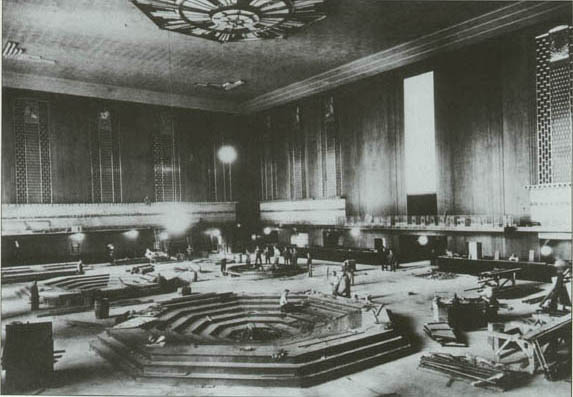 Another floor was added above this Board of Trade floor to make room for the Chicago Board Options Exchange in 1973. When the addition was built, psychic Jeane Dixon erroneously predicted it would come crashing down onto the Board of Trade. with new ways of doing business. And they're playing to win. Sound familiar? Take, for example, the Frankfurt based Eurex, which trades futures on Swiss and German financial products. That firm surpassed the Chicago Mercantile Exchange in volume last year; trading 248.2 million contracts to become the second most active exchange in the world. Much of Eurex's business is done online, and its volume for the month of January surpassed even the massive Board of Trade by three million contracts. And there's the London Intentional Financial Futures Exchange. That exchange is closing its trading floor altogether; and in the process dismissing nearly half of its 1,100 workers. The move to all-electronic trading will lower costs and enable the London exchange to better compete with the Eurex. Meanwhile, the Chicago Board Options Exchange, which trades stock-related products, will face formidable competition next year when the all-electronic International Securities Exchange is scheduled to open. That New York-based exchange announced it will begin trading options on the 600 most active equities, cherry-picking the Options Exchange's most lucrative stocks. Perhaps more threatening in the long run, the traditional member-based exchanges could themselves become outmoded as all-electronic Internet networks enable individuals to bypass the trading floors. Due to a recent decision by the federal Securities and Exchange Commission, these Electronic Commerce Networks will be allowed, beginning this month, to declare themselves "exchanges." These threats, coupled with automated trading technology, has the Chicago exchanges concerned. Customers already complain that the controlled chaos of the traditional "open outcry" floors - a system that was devised a hundred years ago - sometimes leads to unsatisfactory, time-consuming trades. And some predict they are doomed, destined to be replaced by a roomful of computers, where account managers quietly type in orders. Certainly, the exchanges are changing. And a way of life is passing, along with the Teletype and the chalk boards - and the clerks, the runners, perhaps even the yelling traders. Many of the thousands of other jobs that keep the exchanges running will be shifted to the headquarters of customer firms. And Jack Wing, who once headed a Chicago investment house, says the trading community will demand better educated workers, workers trained in technology "The more competition,
|
Pages:|1 ||2 | |3 ||4 | |5 ||6 | |7 ||8 | |9 ||10 | Pages:|11 ||12 | |13 ||14 | |15 ||16 | |17 ||18 | |19 ||20 |
Pages:|21 ||22 | |23 ||24 | |25 ||26 | |27 ||28 | |29 ||30 | Pages:|31 ||32 | |33 ||34 | |35 ||36 | |37 ||38 | |39 ||40 | Pages:|41 ||42 | |43 ||44 |